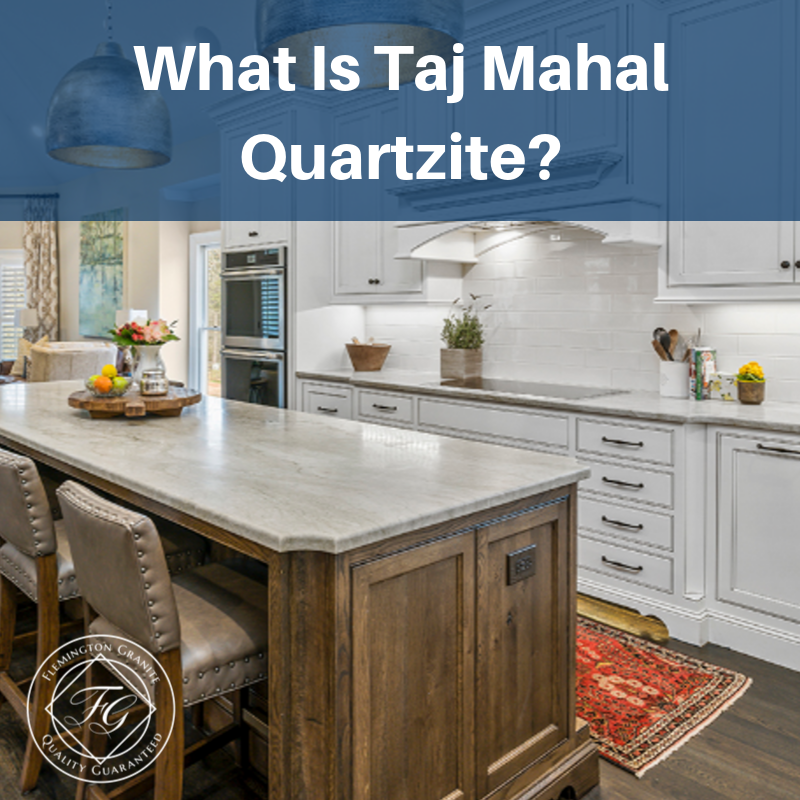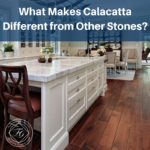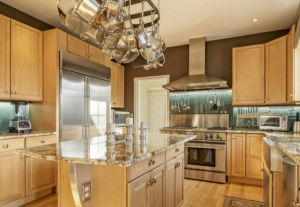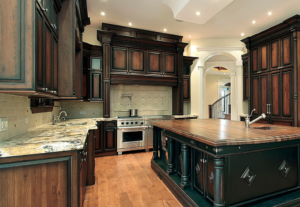
Introduction To Taj Mahal Quartzite
Taj Mahal quartzite is a beautiful stone that has become very popular in recent years. It offers an elegant and classic look with a durability that is hard to match. This stone is mostly white in coloration, but it contains many bands and striations of darker colors like brown, blue, or gold. Because of this, it has a look that is similar to high-end granite and marble slabs. For those who have never heard of this stone, let’s take a quick look at its qualities.
Quartz Vs. Quartzite
You may have read our previous article on the subject of quartz countertops. If you assumed quartz and quartzite to be the same thing, you have made an understandable mistake. Although they are very similar in name and properties, quartz and quartzite are two different stones.
It is quite easy to tell these stones apart based on their appearance. Pure quartz is normally transparent and crystalline, like this example. Quartzite, on the other hand, has a wide variety of colors and textures. In essence, quartzite is nothing but quartz that has been mixed with something else.
However, there is a more significant difference for those who are interested in buying decorative slabs. Quartz countertops, as you may remember, are a conglomerated material made of powdered quartz, quartz chips, and epoxy resin. Quartzite slabs, on the other hand, are usually cut from a solid chunk of stone.
Where Does Taj Mahal Quartzite Get Its Name?
If you know what the Taj Mahal is, you know that it’s a historical building located in India. However, this stone does not come from India. Rather, it comes from Brazil, which is one of the biggest producers of quartzite slabs.
So why the name? Well, if you look at the surface of the Taj Mahal, most of it resembles the look of Taj Mahal quartzite. It is mostly white, with bands of other colors creating an appealing pattern. Thus, this stone is named only for its resemblance to the famous Taj Mahal.
How Is Taj Mahal Quartzite Used?
This type of stone can be used in a variety of ways, much like a slab of granite or soapstone or any other. The list is nearly endless, but here are just a few of the many ways that this stone can be used:
- Countertops
- Sink tops
- Floor tiles
- Backsplashes
- Desk tops
- Wall decor
- Decorative slabs
- Cutting boards
- Table tops
How Expensive Is Taj Mahal Quartzite?
This type of stone is definitely on the higher end of the price spectrum. Many people have remarked on this, but we want to give you a more exact picture. Let’s look at this big slab here. This is a large piece of Taj Mahal quartzite that measures 55×110 inches. That’s 4.5 feet by 9 feet, with a thickness of 2-3 centimeters. Total price is about $3,100, which is quite a bit. When we break that down to dollars per square foot, it comes about to about $76.54.
Properties Of Quartzite:
We are looking at this material from a practical perspective. Therefore, we need to look at its physical qualities so that the reader (you) can determine if this material will be the right choice for you.
First, let’s talk about hardness. Like quartz, quartzite has a hardness of 7 on the Mohs scale. The scale stops at 10, so that is extremely hard. Granite usually has a rating between 6 and 6.5, with marble being much softer at 3-4. In terms of durability, this stone is well worth its cost.
That brings us to the only significant problem with the use of this stone. As we saw already, it is quite expensive. You certainly won’t save any money by going with this option, but you will get a stone of unsurpassed beauty and durability.
Let’s talk a little bit about porosity. Porosity is simply the ability of a stone to absorb liquids. For most purposes, you want a stone that does not allow any liquids to soak through.
A greater amount of porosity will make allow more liquid because the material is not so densely packed. There are tiny gaps that allow moisture to pass into the stone. While some varieties of quartzite are porous, Taj Mahal quartzite is one of the least porous. It could very well be described as a waterproof stone because its material is so densely packed. This means that you won’t have to use a sealer
In terms of beauty, you could not ask for a better choice. This video gives you a very up-close look at a particularly beautiful example of this stone. When you watch this, you can see why it is so expensive. Another upside of this stone is the relative lack of maintenance required. You won’t have to seal it or buy any special cleaners, and you won’t have to take any special care when using it due to its extreme hardness. You will need to wipe it down from time to time and keep it from building up dirt and grime, but that’s about all.
Conclusion
Overall, Taj Mahal quartzite is one of the best premium decorative stones in the world. You should now be a little more familiar with the properties of this stone, and thus, you should now realize why it is so costly. It offers the beauty of the finest white marble, but with a hardness that puts nearly everything else to shame. Unless you can afford a countertop made of diamonds, you aren’t going to get anything tougher than this.
We hope that this article has been helpful to you, even though it is too short to cover all the benefits and uses of this beautiful stone. If you would like to read more articles like this, please fill out the contact form below.






